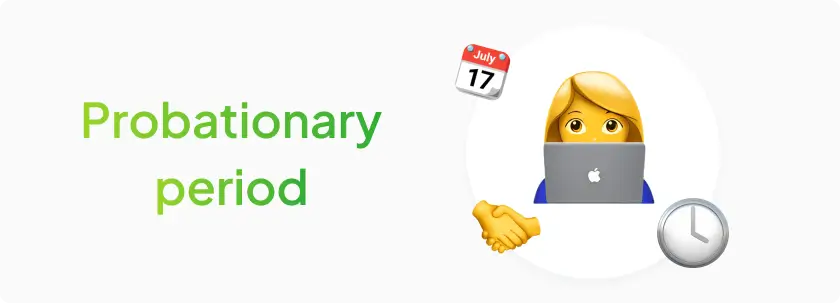
The probationary period is a period during which the employer assesses the competence and suitability of the new employee for the job. This stage allows both parties to make sure they have made the right choice. Let’s take a look at the main aspects of the probationary period, its features and tips for successful completion.
Why is the probationary period important?
Importance for employees
- Assessment of the work environment: Employees have the opportunity to familiarize themselves with the working conditions, corporate culture, and team. This allows them to understand whether this work environment suits them and whether they feel comfortable in the company.
- Realistic assessment of responsibilities: The probationary period at work allows the employee to see what kind of duties they will have to perform in practice. This helps to understand whether their expectations are in line with the actual work and whether they will be able to cope with such responsibilities.
- Adaptation and training: This period allows the employee to adapt to the new environment, familiarize themselves with the company’s internal processes, and learn new skills necessary to successfully complete tasks.
- Feedback: During the probationary period, the employee receives feedback from the management on their work. This helps to understand their strengths and areas for improvement, which is important for professional development.
- Assessment of career opportunities: An employee can assess the prospects for career growth in the company, learn about training, development and other benefits, and understand what the chances are for career advancement.
Importance for employers
- Assessment of competence: The probationary period allows the employer to assess whether the employee has the necessary skills and knowledge to perform the tasks assigned. This helps to make sure that the candidate is the right one.
- Adaptation to the corporate culture: The employer can observe how well the employee fits into the corporate culture and team. This is important for creating a harmonious and efficient work team.
- Assessment of productivity and efficiency: During the probationary period, the employer can evaluate the employee’s productivity and efficiency. This allows them to draw conclusions about their potential and the possibility of further development in the company.
- Risk mitigation: The probationary period reduces the risks of false hiring, as it allows you to identify inconsistencies at the early stages of cooperation. This helps to avoid the cost of re-hiring and training a new employee.
- Assessment of loyalty and motivation: Employers can assess the level of employee loyalty and motivation. This helps to understand how interested the employee is in long-term cooperation and is ready to invest his or her efforts in the company’s development.
Therefore, the probationary period at work is important for both parties. The employer can understand the correctness of the candidate’s choice, and the employee can assess his or her strengths and career opportunities.
Features of the probationary period

Duration of the probationary period
The length of the probationary period may vary depending on the specific company and the position for which the employee is hired. It usually ranges from one to three months. In some cases, the probationary period may be extended up to six months if it is stipulated in the employment contract and agreed upon by both parties. The maximum probationary period is usually 6 months.
Conditions of the probationary period
The terms and conditions of the probationary period should be clearly stated in the employment contract and job offer so that the employee understands all the details immediately. This includes:
- The length of the probationary period.
- Whether the probationary period is paid.
- Expected results and evaluation criteria for the employee.
- Working conditions that may differ from the permanent conditions (for example, the salary may be lower or the same as after the probationary period).
- Conditions for early completion of the probationary period.
- Possibility and conditions of termination of the contract during the probationary period.
Opportunities for training and development
The probationary period is often used to train a new employee. This may include training, study sessions, and mentoring from experienced colleagues. This helps the employee to adapt faster and learn new skills.
The right to terminate the employment contract
During the probationary period, both the employee and the employer have the right to terminate the employment contract under a simplified procedure. This avoids unnecessary costs and lengthy procedures if one of the parties decides that cooperation is no longer appropriate.
Building mutual trust
The probationary period helps to build mutual trust between the employee and the employer. This is important for further successful cooperation and creating a positive working atmosphere.
How to successfully complete the probationary period: tips for employees
Passing the probation at work can sometimes be a challenging process, but with the right approach, you can successfully adapt to the new environment and ensure a positive impression on your employer. Here are some tips to help you successfully complete your probationary period.
- Research the company: Before you start, read up on the company, its mission, values, and culture. This will help you better understand what employers expect from you.
- Familiarize yourself with the job description: Study your responsibilities and job requirements in detail. This will help you understand what skills and knowledge you need to demonstrate in the first place.
- Take initiative: Don’t wait to be given a task. Offer to help, take on additional responsibilities, and show that you are willing to work.
- Ask questions: If you don’t understand something, ask. This shows your interest and desire to understand the work.
- Be open and friendly: Make contacts with your colleagues, communicate with them and learn from them. Open communication will help you adapt to the new team faster.
- Get feedback: Regularly ask your manager for feedback on your work. This will help you understand what you do well and what you need to work on.
- Plan your workday: Create a list of tasks and priorities for each day. This will help you manage your time more efficiently and keep important tasks on track.
- Meet deadlines: Always try to complete tasks on time. If you can’t make it, notify your management and colleagues in advance.
- Attend training and educational sessions: Take advantage of all opportunities for learning and development. This will help you improve your professional skills and become a valuable employee.
- Self-education: Read professional literature, articles, watch webinars and learn new things even outside of work.
- Follow company rules and regulations: Follow the company’s established rules and norms of behavior. This will help you avoid misunderstandings and conflicts.
- Support the corporate culture: Participate in corporate events, team building and other activities. This will help you integrate into the team.
- Be optimistic: Even if something doesn’t work out the first time, don’t lose heart. Approach problems with a positive attitude and look for ways to solve them.
- Maintain a work-life balance: Don’t forget about rest and personal activities. A healthy balance will help you be more productive and focused at work.
These tips will help you show your interest in the job and your professional skills. Follow these rules and you will get the job you want.
Conclusion
Probationary periods allow employers and employees to realize that they have made the right choice. If you want to successfully pass your probationary period, follow the rules mentioned above and show your management that you are ready to work. Always clarify the terms of the probationary period and don’t be afraid to ask questions.












